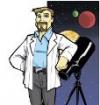

| Visitors Now: | |
| Total Visits: | |
| Total Stories: |
City Light Pollution Affects Air Pollution
http://www.dearastronomer.com/
From the International Dark Sky Association press release:
Excess light at night can contribute to air pollution, according to a study by scientists at the National Oceanic and Atmospheric Administration (NOAA) and the Cooperative Institute for Research in Environmental Sciences (CIRES) at the University of Colorado. Findings presented at the American Geophysical Union in San Francisco on Monday indicate that uplight from outdoor lighting that contributes to sky glow over cities also interferes with chemical reactions that naturally clean the air during nighttime hours.
Every night, chemicals from vehicle exhaust and other human created sources are broken down and prevented from becoming smog, ozone, or other irritants by a form of nitrogen oxide called the nitrate radical. Sunlight destroys the naturally occurring nitrate radical, so this process occurs only in hours of darkness.
Measurements taken over Los Angeles by aircraft show that light pollution from cities is suppressing the radical. Though the lights are 10,000 dimmer than the Sun, the study’s first results indicate that city lights can slow down the nighttime cleansing by up to 7% and they can increase the starting chemicals for ozone pollution the next day by up to 5%.
Many cities are close to their limits of allowable ozone levels, so this news is expected to have big implications for outdoor lighting practices and should be of special interest to the Environmental Protection Agency. Read IDA Press Release
You can read the full press release at: http://docs.darksky.org/PR/PR_CityLightPollutionAffectsAirPollution.pdf
Ray Sanders is a Sci-Fi geek, astronomer and blogger. Currently researching variable stars at Arizona State University, he writes for Universe Today, The Planetary Society blog, and his own blog, Dear Astronomer
2012-12-04 08:05:23
Source: http://www.dearastronomer.com/2010/12/17/city-light-pollution-affects-air-pollution/
Source:



